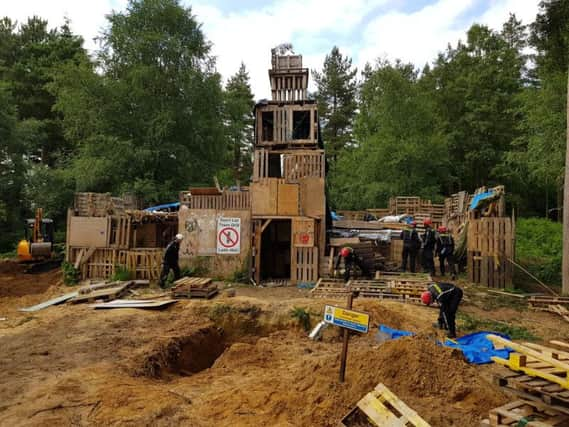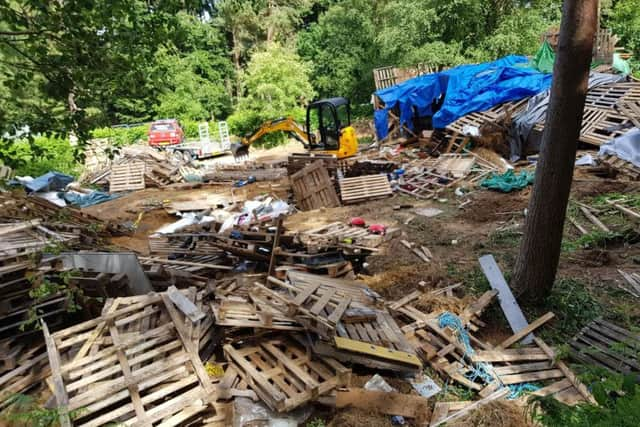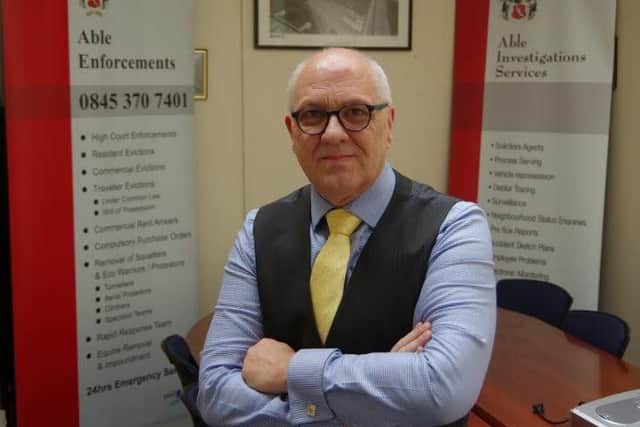Why bailiffs who demolished 'Great Escape'-style protest camp may soon be involved in Yorkshire's fracking fight


The specialist team, some carrying riot shields, arrived at the protest camp at 4am, dragging environmental campaigners from the giant fort they had been living in for months, overseeing others being cut free from reinforced tubes they had locked themselves into and in one case, leading a woman away tied to an orange stretcher. In the following hours and days, an elaborate network of tunnels running hundreds of feet deep underneath the site was uncovered, while a JCB was deployed to pull down the fort.
These dramatic events unfolded last summer in Leith Hill in Surrey at the site of a protest camp set up in the hope of preventing oil exploration work starting nearby. But similar scenes may soon be taking place across Yorkshire as the battle over fracking in the county intensifies, according to Steve Wood, the man who oversaw the Leith Hill operation.
Advertisement
Hide AdAdvertisement
Hide AdThe Bristol-based former police officer is the managing director of Able Investigations and Enforcements, a company which specialises in the evictions of squatters, travellers and protesters for public and private landowners. Wood says discussions have already been taking place with several different parties in Yorkshire about the possibility of carrying out similar removal work relating to fracking protests; with an oil and gas company, a local council and “a number of private landowners” in contact with his firm.


Seven companies have been granted Government licences to explore large parts of Yorkshire to see if fracking is feasible. The controversial process of extracting shale gas from rocks deep underground has not been used in the UK since 2011 after it was deemed to have been the cause of earth tremors in Lancashire.
An anti-fracking ‘protection camp’ has been in operation on a private field since December 2016 on the outskirts of the Ryedale village of Kirby Misperton, where firm Third Energy has been planning to conduct test fracking. Some campaigners have gone on to set up caravans and tents on the road next to the entrance to the company’s site in recent months.
But while it was announced on Friday the camp would be voluntarily closed as protesters declared ‘victory’ as a result of Third Energy withdrawing fracking equipment from the site while the company awaits a Government review of its finances, a spokesman for the camp said: “We end this with a warning to any fracking company planning to exploit this land for your own profit and personal gain: Expect us.”
Advertisement
Hide AdAdvertisement
Hide AdEarlier this year, anti-fracking campaigners set up a similar fracking protest camp near Doncaster where a company called IGas has been granted to explore for shale gas close to the village of Misson on the Nottinghamshire-South Yorkshire border.


With environmental campaigners promising to fight the fracking industry across Yorkshire - and public inquiries planned for later this year that could pave the way for similar exploration work to begin close to Sheffield and Rotherham, combined with the prospect of other tests taking place in North Yorkshire - it is expected that more protest camps will soon be springing up around the region.
When asked by The Yorkshire Post if the firm has had discussions about potentially working on fracking camp issues in this region, Wood says: “All I’m prepared to say is yes, we have. I can’t go into any further details. We are already planning for a couple of sites in the area.”
Wood says that around six years ago he spotted a “gap in the market” to specialise in the removal of protesters and travellers from private land. “We are a form of bailiffs but we don’t debt collect. You assume a bailiff takes people’s televisions away for not paying their council tax. We specialise in dealing with protesters, squatters and travellers right across the UK. We are the only firm that is riot-trained, handcuff-trained and conflict management-trained.”
Advertisement
Hide AdAdvertisement
Hide AdHe says the Leith Hill situation is a good example of how civil law powers can be used to remove protesters from their land. His team were sent in after Europa Oil and Gas, the company involved with the Surrey site, got a High Court order to remove campaigners who had been occupying land the company had been leasing from the Forestry Commission for several months.


“They had created a tunnel system the like of which I had never seen before. We turned up at 4am and cleared the site within 48 hours. We had several ‘lock-ons’ which we dealt with. Officially, there were between 30 to 40 protesters living at the camp but we had information there were limited numbers on site at that stage and we were ready to go. Some of them tried to get to the tunnels. But within the first hour, we had secured the grounds. We worked with various partners to start targeting the people who had lock-ons. Two days later, we had everybody out. It took another two days to ‘mop up’ - we searched the entire area and the tunnels. Eight months later, there is nobody on that site.”
However, Wood says protesters have moved to a site across the road and now occupy a considerably larger area of land. But he says the situation highlights the need for decisive action when such protesters move on to a site. “Unless people act quickly, these camps grow very quickly. What I would say to the gas and oil companies and the private landowners is that when protesters do turn up, don’t leave it too long to act. The longer you wait, the more they will dig in and the harder it will be to deal with.
“If you wake up at 7am and you have got tents or caravans on your land, by 8am you should have phoned us or a local bailiff. You speak to these people and they say we will be gone by the end of the week. But by that time, there will be many more there.”
Advertisement
Hide AdAdvertisement
Hide AdWood says he believes there is an important distinction to be made between local residents with genuine concerns about a policy like fracking and what he terms “professional protesters” who move from site to site in the country. He claims that during the Leith Hill job some of his staff were racially abused, while on other occasions, his workers have to had to avoid ‘ankle breaker’ traps in which hidden iron bars had been laid in the hope of causing serious injury to them.


“People have every right to protest and I have no problem with peaceful protest whatsoever. What I have a problem with is the professional protesters who try to stop a company from working. I have had police sat outside my house because protesters have got hold of my home address.
“There is an element to the protesters which doesn’t have much interest in what they are protesting about and just want to cause a disturbance and ramp up the costs to the company or the individual. People can go about protest legally and do everything they can to prevent something. But when you damage other people’s property, when you stop people from working, when you threaten them, that to me is wrong.
“My own views about fracking are irrelevant to what we do. We are there to implement the law, no different to a policeman but on the civil side. We are not dealing with Mrs Miggins with a placard. We are dealing with people who see this as warfare.”